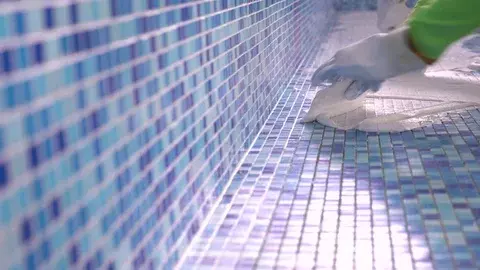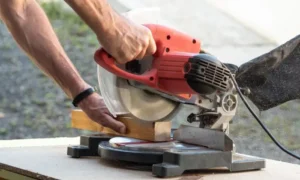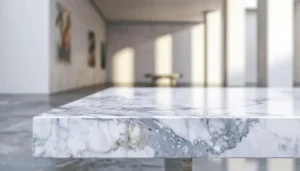Pool Tile Adhesive For Secure And Stylish Installations
Pool tile adhesive and grout play a crucial role in ensuring both the security and style of pool installations. These components including the expertise of sf marble and granite are essential for properly affixing and sealing tiles in swimming pools, creating a durable and visually appealing finish. Let’s explore the importance of pool tile adhesive and grout in more detail.

Secure Installations: Pool tile adhesive is specifically formulated to bond tiles to various surfaces, such as concrete, fiberglass, or plaster, creating a strong and secure attachment. It is designed to withstand the constant exposure to water, chemicals, and temperature fluctuations that are common in pool environments. A secure tile installation is vital for preventing tiles from dislodging, which can lead to safety hazards and costly repairs agents.
Water Resistance: Pool tile adhesive is typically water-resistant or even waterproof, ensuring that it maintains its adhesive properties even when submerged in water. This resistance is crucial as pools are constantly exposed to water, and standard adhesives may deteriorate or lose their grip over time. Water-resistant adhesive helps to prevent water penetration behind the tiles, minimizing the risk of damage to the pool structure and reducing the chances of mold or mildew growth.
Maintenance and Longevity: Properly applied pool tile adhesive and grout significantly contribute to the longevity and ease of maintenance of pool installations. Securely attached tiles with sealed joints guided by Sf marble ,are less prone to cracking, shifting, or requiring frequent repairs. The water-resistant properties of the adhesive and grout make cleaning and maintenance more manageable, as they can withstand regular exposure to pool chemicals and cleaning
Understanding Pool Tile Adhesive and Grout
Pool Tile Adhesive: Pool tile adhesive is a specialized type of adhesive used to bond tiles to the surface of swimming pool walls and floors. It is designed to withstand the harsh conditions of a pool environment, including exposure to water, chemicals, and varying temperatures. The adhesive creates a strong and durable bond between the tiles and the pool surface, ensuring they remain in place even under high-pressure conditions.
Pool Tile Grout: Pool tile grout is a cementitious or epoxy-based material used to fill the gaps between tiles in a swimming pool. Its purpose is to provide a watertight seal, prevent water penetration, and protect the underlying surfaces from damage caused by water infiltration. Grout also enhances the aesthetic appearance of the tiled area by creating a uniform and clean finish.
Key Characteristics of an Ideal Pool Tile Adhesive and Grout
Chemical Resistance: Since pool environments contain chemicals such as chlorine and other sanitizers, the adhesive and grout should be highly resistant to these chemicals. They should not degrade or deteriorate when exposed to pool water or cleaning agents commonly used in pool maintenance.
UV Resistance: Pool tile adhesive and grout should be formulated to withstand prolonged exposure to sunlight and UV radiation. This characteristic helps prevent fading, discoloration, or degradation of the adhesive and grout over time.
Flexibility: Flexibility is an important feature of swimming pool tile adhesive and grout, as the materials should be able to accommodate slight movements or expansion and contraction of the pool structure without cracking or dislodging the tiles. This flexibility helps maintain the integrity of the installation.
Strong Bonding Strength: The adhesive should have a strong bonding strength to ensure that tiles remain firmly attached to the pool surface. This strength is necessary to withstand water pressure, impacts, and other forces experienced in a pool environment.
Durability: Both the adhesive and grout should be long-lasting and able to withstand the rigors of a pool environment over an extended period. They should resist degradation, cracking, or deterioration due to water, chemicals, temperature fluctuations, and other environmental factors.
Easy Maintenance: An ideal pool tile adhesive and grout should be relatively easy to clean and maintain. They should not require frequent reapplication or extensive maintenance to ensure their effectiveness and appearance.
Types of Pool Tile Adhesive and Grout
Cement-Based Adhesive and Grout
Composition and Working Mechanism: Cement-based adhesive and grout are commonly used in pool tiling projects. They consist of a mixture of cement, sand, and sometimes additives such as latex or polymers for improved flexibility and adhesion. The adhesive and grout are typically sold as separate products but share similar composition and working mechanisms.
The adhesive is used to bond the tiles to the pool’s surface, while the grout is used to fill the gaps between the tiles.
Cement-Based Adhesive: The adhesive is mixed with water to form a thick paste. It is then applied to the back of the tile using a notched trowel, creating a ridged pattern. When the tile is pressed onto the pool surface, the ridges collapse, ensuring good contact and adhesion. The adhesive cures over time, forming a strong bond between the tile and the pool.
Cement-Based Grout: The grout is also mixed with water to create a paste-like consistency. It is applied to the gaps between the tiles using a grout float or a rubber trowel. The excess grout is wiped off the tile surfaces, and the grout is left to cure. As it cures, the grout hardens and provides stability, preventing movement and protecting against water penetration.
Pros:
Strength and Durability: Cement-based adhesive and grout offer excellent strength and durability, making them suitable for pool environments where they will be exposed to water and chemicals.
Cost-Effective: Cement-based products are generally more affordable compared to other types of adhesives and grouts.
Wide Availability: Cement-based adhesives and grouts are widely available in hardware stores and construction supply centers.
Cons:
Prone to Staining: Cement-based grouts are porous and can absorb water, dirt, and stains if not properly sealed. They may require regular maintenance and sealing to prevent discoloration.
Limited Flexibility: Cement-based products can be rigid, lacking flexibility. This can be problematic in areas with temperature variations or ground movement, as it may lead to cracking or tile displacement.
Longer Curing Time: Cement-based adhesive and grout typically have longer curing times compared to other types of adhesives and grouts. This may result in extended project timelines.
Epoxy-Based Adhesive and Grout
Composition: Epoxy-based adhesives and grouts consist of two main components: epoxy resin and a hardener (also known as a curing agent). These components are typically supplied as separate materials that need to be mixed together in specific proportions before use. The epoxy resin is a viscous liquid that acts as the adhesive or grout’s base, while the hardener is a catalyst that initiates the curing process.
Working Mechanism: When the epoxy resin and hardener are mixed together, a chemical reaction called curing or polymerization occurs. This reaction transforms the liquid mixture into a solid, durable material. Epoxy adhesives and grouts typically cure through an exothermic reaction, meaning they generate heat as they solidify.
The curing process of epoxy adhesives and grouts is influenced by factors such as temperature, humidity, and the specific formulation of the epoxy system. It is crucial to follow the manufacturer’s instructions regarding the mixing ratios, application methods, and curing times to ensure optimal performance.
Pros:
Strong Bonding: Epoxy adhesives offer exceptional bonding strength, allowing them to bond various materials, including metals, concrete, ceramics, and plastics. This makes them suitable for a wide range of applications.
Chemical Resistance: Epoxy adhesives and grouts are highly resistant to chemicals, including solvents, oils, and acids. They can withstand exposure to harsh environments, making them suitable for use in industrial settings or areas where chemical resistance is required.
Durability: Epoxy-based adhesives and grouts create durable bonds that are resistant to moisture, heat, and physical stress. They can maintain their integrity over extended periods, making them suitable for long-lasting applications.
Cons:
Mixing Complexity: Epoxy-based adhesives and grouts require precise mixing of the resin and hardener components in the correct ratios. Failure to follow the instructions can result in incomplete curing or compromised performance.
Curing Time: Epoxy systems often require a longer curing time compared to other adhesives or grouts. This can extend the overall project timeline, especially when multiple applications or layers are involved.
Cost: Epoxy-based adhesives and grouts are generally more expensive than other adhesive options. Their higher cost is primarily due to the specialized formulations and superior properties they offer.
Pool Tile Adhesive UnderWater
When it comes to installing tiles underwater, it is crucial to use specialized pool tile adhesive that is designed for this specific application.
Surface Preparation: Proper surface preparation is essential for a successful tile installation. Ensure that the substrate (the surface where the tiles will be installed) is clean, free from debris, and structurally sound. It should also be free from any oils, greases, or other contaminants that may hinder the adhesive’s bonding ability.
Adhesive Selection: Choose a high-quality pool tile adhesive that is specifically formulated for underwater applications. These adhesives are designed to withstand water immersion and offer excellent bonding strength and resistance to moisture and pool chemicals.
Mixing: Follow the manufacturer’s instructions for mixing the adhesive. Use clean water and a suitable mixing tool to achieve a smooth, lump-free consistency. Avoid mixing more adhesive than you can use within the pot life of the product to prevent wastage.
Application: Apply the adhesive to the back of the tile using a notched trowel. The size of the trowel notch should be appropriate for the size of the tile being installed. Ensure complete coverage of the tile’s back to achieve proper adhesion.
Submersion Technique: To install the tile underwater, carefully lower it into place, making sure it aligns with the surrounding tiles. Apply firm pressure to the tile, pushing it into the adhesive to ensure a secure bond. Avoid sliding the tile sideways, as this can displace the adhesive.
Grouting: Allow the adhesive to cure as per the manufacturer’s instructions before grouting. Use a pool-grade grout that is suitable for underwater applications. Apply the grout using a grout float, pressing it firmly into the gaps between the tiles. Remove excess grout from the tile surface using a damp sponge.
The Ultimate Pool Tile Adhesive and Grout
The Ultimate Pool Tile Adhesive and Grout is a cutting-edge product specifically designed for secure and stylish installations in swimming pools. It combines exceptional adhesive properties with superior grouting capabilities, making it the ideal choice for both professionals and DIY enthusiasts looking to achieve long-lasting and visually appealing results.
Unique Features and Benefits for Secure and Stylish Installations
Superior Adhesion: The Ultimate Pool Tile Adhesive and Grout offers exceptional bonding strength, ensuring that the tiles stay firmly in place even in demanding pool environments. It creates a strong and durable bond between the tiles and the pool surface, providing maximum security against potential loosening or displacement.
Waterproof and Chemical Resistant: This adhesive and grout solution is specially formulated to withstand the harsh conditions of swimming pools. It is highly resistant to water, chlorine, and other pool chemicals, preventing any damage or deterioration over time. Its waterproof properties also ensure that it maintains its integrity, even when submerged in water for extended periods.
UV Resistance: The Ultimate Pool Tile Adhesive and Grout is designed to resist the damaging effects of UV radiation. Prolonged exposure to sunlight can cause fading and discoloration in many tile adhesives and grouts, compromising the aesthetic appeal of the pool. However, this product is formulated to maintain its color stability, ensuring that your pool retains its attractive appearance for years to come.
Versatile Application: Whether you are installing new tiles or renovating an existing pool, this adhesive and grout product offers versatile application options. It can be used on various pool surfaces, including concrete, fiberglass, and certain types of tiles. Its versatility allows for creative and customized designs, accommodating a wide range of pool styles and shapes.
Ease of Use: The Ultimate Pool Tile Adhesive and Grout is user-friendly, making it suitable for both professionals and DIY enthusiasts. It has a smooth and creamy consistency, facilitating effortless application and ensuring consistent coverage. Additionally, it has a long working time, allowing for adjustments and fine-tuning during the installation process.
Conclusion
In conclusion, it is crucial to emphasize the significance of using the right pool tile adhesive and grout for your pool tile installations. The adhesive serves as the foundation for holding the tiles securely in place, ensuring long-lasting durability and minimizing the risk of tiles coming loose or falling off. Additionally, the adhesive should be specifically formulated for pool environments to withstand constant exposure to water, chemicals, and temperature fluctuations.For expert guidance and assistance with pool tile adhesive and grout feel free to contact us.
(FAQs)
What is the importance of using the right pool tile adhesive for installations?
Using the right pool tile adhesive is essential for secure and long-lasting installations. It provides a strong bond between the tiles and the substrate, ensuring they stay in place even in challenging pool environments with exposure to water, chemicals, and temperature changes.
What should I consider when choosing a pool tile adhesive?
When selecting a pool tile adhesive, consider factors such as the type of tiles you are using, the specific pool environment, and the adhesive’s compatibility with those materials. Look for adhesives that are designed for pools, offer excellent bonding strength, and are resistant to water and chemicals.
Can I use any adhesive for pool tiles, or do I need a special one?
It is highly recommended to use a pool tile adhesive specifically formulated for pool installations. Regular tile adhesives may not provide the necessary water resistance and durability required for pool environments. Specialized pool tile adhesives are designed to withstand the unique challenges posed by pools.
Contact Us




